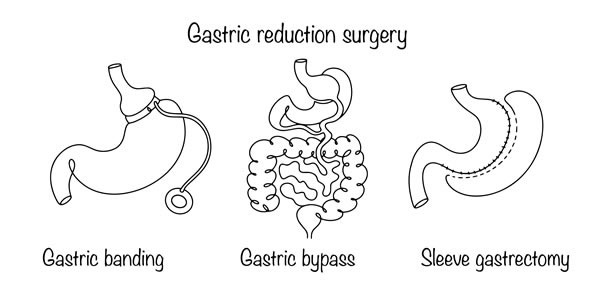
Previous
The Role of Acupressure and Acupuncture in Liver Health

Next
Retatrutide, Weight Loss Injections and Fatty Liver Disease
Pros and Cons of Weight Loss Surgery for Liver Health
There are pros and cons when it comes to any medical procedure, and weight loss surgery is no exception. Find out its impact on liver health.
Research has found a strong connection between obesity and liver disease. (1) So, it comes as no surprise that following a healthy diet and getting regular physical exercise is often recommended for both. However, with bariatric surgeries on the rise (2), it may make you wonder what effect weight loss surgery may have on liver health. Like with most medical procedures, there can be pros and cons.
How Bariatric Surgery Can Benefit the Liver
One potential benefit of weight loss surgery is an improvement in liver enzymes. A 5-year observational study published in the journal Surgeon involved 511 patients who underwent bariatric surgery. Those who began with elevated alanine aminotransferase (ALT) levels had significantly lower ALT and gamma-glutamyl transferase (GGT) levels four months after surgery, and these reductions were sustained over the five years of follow-up. (3)
ALT and GGT are two liver enzymes that speed up chemical reactions to help: (4)
- Break down the foods you eat
- Break down toxins in the body
- Get your blood to clot when you’re cut or injured
- Fight infection
While all this is good, if your liver isn’t functioning properly, it can release these enzymes into your bloodstream. This is why high levels of ALT and GGT in a blood test can be a sign of liver damage.
Weight loss surgery can also positively impact liver disease progression. In a study published on January 7, 2025, researchers looked at 1,205 subjects with obesity and type 2 diabetes. Two years after bariatric surgery, the subjects’ liver fibrosis scores substantially declined, and they experienced no increased risk of liver cirrhosis. (5)
Potential Cons of Weight Loss Surgery for Liver Health
Even though bariatric surgery can have positive effects on liver enzyme levels and help slow disease progression, it also has some cons. Understanding the potential drawbacks is important when deciding whether this option is right for you.
The first con is that not all research has associated weight loss surgery with improved liver health. For example, after surgery, patients can experience malnutrition issues, leading to vitamin or mineral deficiencies or making existing deficiencies worse.
One nutrient at risk of becoming deficient post-bariatric surgery is vitamin K (6). This nutrient is important for blood clotting, wound healing, and healthy bones, and its deficiency is already an issue for people with advanced liver disease who aren’t taking vitamin K antagonists. (7)
Another study reports that bariatric surgery is connected with a higher risk of alcohol use disorder. It found that individuals undergoing gastric bypass surgery—which involves dramatically reducing the stomach’s size and attaching this new “pouch” directly to the small intestine—had a 2-3-fold greater risk of alcoholic hepatitis. (8)
Bariatric surgery also isn’t a magic pill for weight loss. In other words, you can’t just have a sleeve gastrectomy, gastric bypass, or other procedure and go back to your old unhealthy habits.

For any of these treatments to be successful, it requires that you maintain a healthy diet and exercise long-term to keep the weight off.
Bariatric Surgery Risks and Complications
It’s also important to consider the potential risks and complications of bariatric surgery. The Mayo Clinic reports that short-term risks can include: (9)
- Excessive bleeding
- Infection
- Blood clots
- Gastrointestinal system leaks
- In rare cases, death
Additionally, long-term complications of weight loss surgery can include:
- Obstructed bowels
- Gallstones
- Low blood sugar
- Malnutrition issues
- Ulcers
- Vomiting
- Acid reflux
- In rare cases, death
Do people have bariatric surgery and not experience any side effects or long-term complications? Of course. But, again, it’s critical to understand these risks before undergoing this or any other medical procedure.
Is Bariatric or Weight Loss Surgery Right for You?
Weight loss surgery isn’t for everyone. This is why it is so important to talk with your healthcare provider to determine whether this option is right (and safe) for you given your health, preexisting conditions, and weight loss or liver health goals.
In the meantime, there are several things you can do to help your liver function as efficiently as possible. In addition to eating right and exercising, they include limiting your alcohol intake, reducing your exposure to toxins, and getting vaccinated against hepatitis A and B. (10) You might also consider a liver supplement for added dietary support.
(1) El-Eschmawy, M.M. (2023, October 16). Impact of Obesity on Liver Function Tests: Is Nonalcoholic Fatty Liver Disease the Only Player? A Review Article. Porto Biomedical Journal. PMID: 37846300
(2) American Society for Metabolic and Bariatric Surgery. (n.d.). Estimate of Bariatric Surgery Numbers, 2011-2022. Retrieved March 19, 2025, from https://asmbs.org/resources/estimate-of-bariatric-surgery-numbers/
(3) Elhelw, O., et al. (2024, February). The Impact of Bariatric Surgery on Liver Enzymes in People with Obesity: A 5-Year Observational Study. Surgeon. doi:10.1016/j.surge.2023.07.006
(4) Cleveland Clinic. (2021, June 28). Elevated Liver Enzymes. Retrieved March 19, 2025, from https://my.clevelandclinic.org/health/symptoms/17679-elevated-liver-enzymes
(5) Seyedi, A., et al. (2025, January 07). Impact of Bariatric Surgery on Liver Fibrosis Indices Among Type 2 Diabetes Patients in a National Cohort. Scientific Reports. doi:10.1038/s41598-025-85427-y
(6) Madhav Ganipisetti, V., Naha, S. (2023, May 19). Bariatric Surgery Malnutrition Complications. StatPearls [Internet]. Retrieved March 19, 2025, from https://www.ncbi.nlm.nih.gov/books/NBK592383/
(7) Jin, S., Hong, L., FakhriRavari, A. (2022). The Role of Vitamin K in Cirrhosis: Do Pharma-K-Netics Matter? Gastrointestinal Disorders. doi:10.3390/gidisord4010003
(8) Kim, H.P., et al. (2022, February 01). Roux-en-Y Gastric Bypass is Associated with Increased Hazard for de novo Alcohol-Related Complications and Liver Disease. Journal of Clinical Gastroenterology. doi:10.10197/MCG.0000000000001506
(9) Mayo Clinic. (2024, July 05). Bariatric Surgery. Retrieved March 19, 2025, from https://www.mayoclinic.org/tests-procedures/bariatric-surgery/about/pac-20394258
(10) Johns Hopkins Medicine. (n.d.). 5 Ways to Be Kind to Your Liver. Retrieved March 19, 2025, from https://www.hopkinsmedicine.org/health/wellness-and-prevention/5-ways-to-be-kind-to-your-liver






